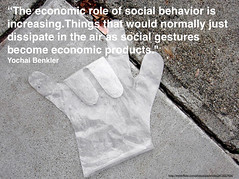(ed: this is a cross post from the PeerIndex blog)
There is extensive buzz around influence and more recently (examples here and here). As Head of Products at PeerIndex, I've spent a lot of time understanding and learning about these areas in the context of wider society.
What became clear early was that the key to understanding was to understand trust and its role in society and markets. From the perspective of trust, reputation is the trust that builds from interaction within a community. Influence is an outcome of having trust of people within a community.
In this series I'll explore why trust is of fundamental importance to society and markets and the way trust is built and measured.
The first post in this series looks at why trust is so important.
The second post in this series looks at measuring trust, its cost and why the cost is key for determining what connections can exist.
Building Trust: Measures and Cost
In small scale communities and markets trust is built overtime by interaction between the participants. Building trust takes time and resources as we need to continually maintain the trust through grooming [Dunbar, 1993]. At these small scales participants can devote the time and resources to this endeavour as the payoffs out weight the cost. In other words the value of the connections outweighs the cost of building trust (I'll refer to this from now on as the cost of trust). The most poignant example of this was the rise of language and the subsequent jump in size of human groupings [Dunbar, 1993]. Language saw the cost of trust fall allowing larger groupings to arise.
The cost of trust determines what connections are possible. A high cost of trust limits what markets can function as the cost exceeds the value of the connections. Cost of trust forms part of the cost of transactions that determine structure of markets and entities operating within those markets [Coase, 1937]. As the cost of trust rises there is a shift from purely market orientated economy to one that is characterised by firms.
The 2008 Financial Crisis illustrates the power of the cost of trust. Investors relied on ratings as a measure of trust in the securities where a good risk. When investors lost trust in those ratings as the mortgages went sour, those cost of trust needed for a transaction skyrocketted. Now investors would need to do time and resource consuming due dilligence on every security they wish to purchase. The potential value of that would come from owning the security paled in comparison to the cost of trust and the markets froze as investors were no longer willing to purchase the securities.
To reduce the cost of trust, we've developed various measures to indicate trust. These measures include items such as:
- degrees and certificates from accredited training institutions,
- chartered status from professional societies,
- contracts,
- 3rd party ratings for items (such as bond ratings), and
- trademarks.
Many of these measures are indicators of trust in expertise or provenance. Some of these are trust measures for goods and services and others for people. These types of measures reduce the cost of trust by allowing people and products to "inherit" the trust of provider. As this is spread across multiple people and products the marginal cost falls.
These trust measures form part of the most important measure of trust: reputation. Reputation is essentially the sum of all the trust that a community has in someone or an organisation. It arises out of interactions within a community [Bischke, 2011]. Reputation reduces the cost of trust by allowing you to use other's people trust in someone. It essentially amortises the cost of trust across multiple interactions over time. Reputation is rooted in community and cannot exist outside of community. Reputation is provided to someone by the community and can very easily taken away by the community.
Reputation started as word of mouth, "should I trust her?". This works in smaller communities but it has scale problems as it is invariably tied to human limitations. To overcome this reputation has evolved to include other measures of trust such as degrees, chartered status, memberships of organisations etc. Indeed reputation is now a graph of various measures that indicate trust at both a global (overall) and local (by context e.g. is this person a good plumber?) [Bischke, 2011].
What is exciting now is that we are reaching the point where building comprehensive reputation graphs is both scalable and falling in cost. With this comes falling cost of trust enabling new connections and new markets.
Bibliography
- Dunbar, R.I.M. (1993) Coevolution of neocortical size, group size and language in humans, Behavioral and Brain Sciences 16 (4): 681-735.
- Coase, R. (1937) "The Nature of the Firm", Economica 386–405
- Bacharach, M. & Gambetta, D. (2001) “Trust in signs”. In K. Cook (ed.) Trust and Society, New York: Russell Sage Foundation, pp. 148–184
- Bischke, J. (2011) "Reputation Graph: One of the Web’s largest opportunities"
- Bischke, J. (2011) "Reputation Graph vs. PeopleRank"
 Image by Dave Duarte via Flickr
Image by Dave Duarte via Flickr